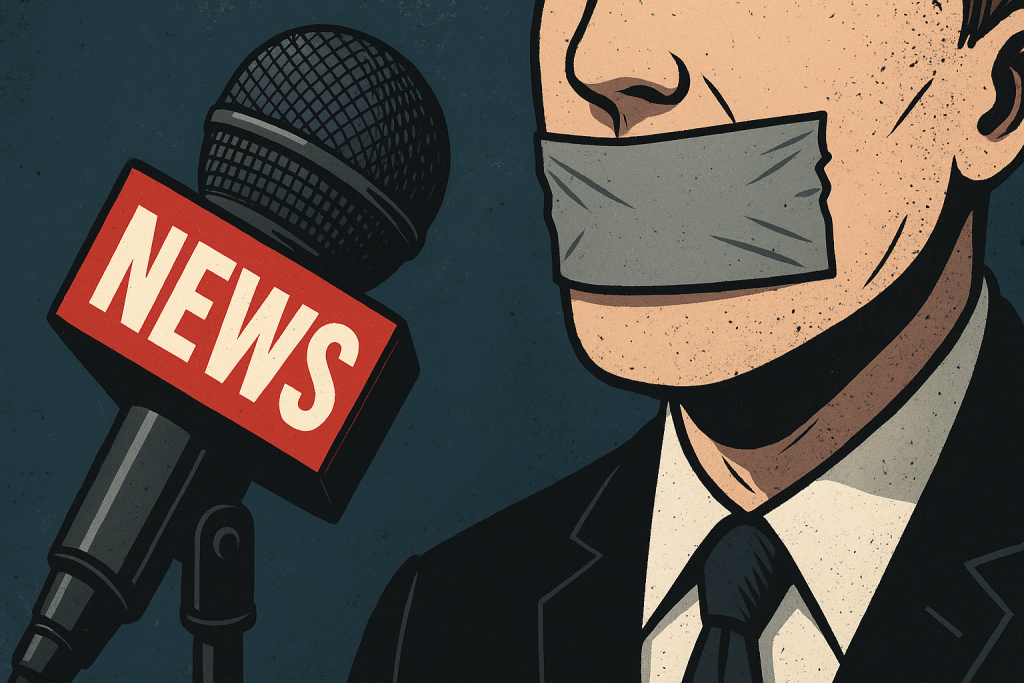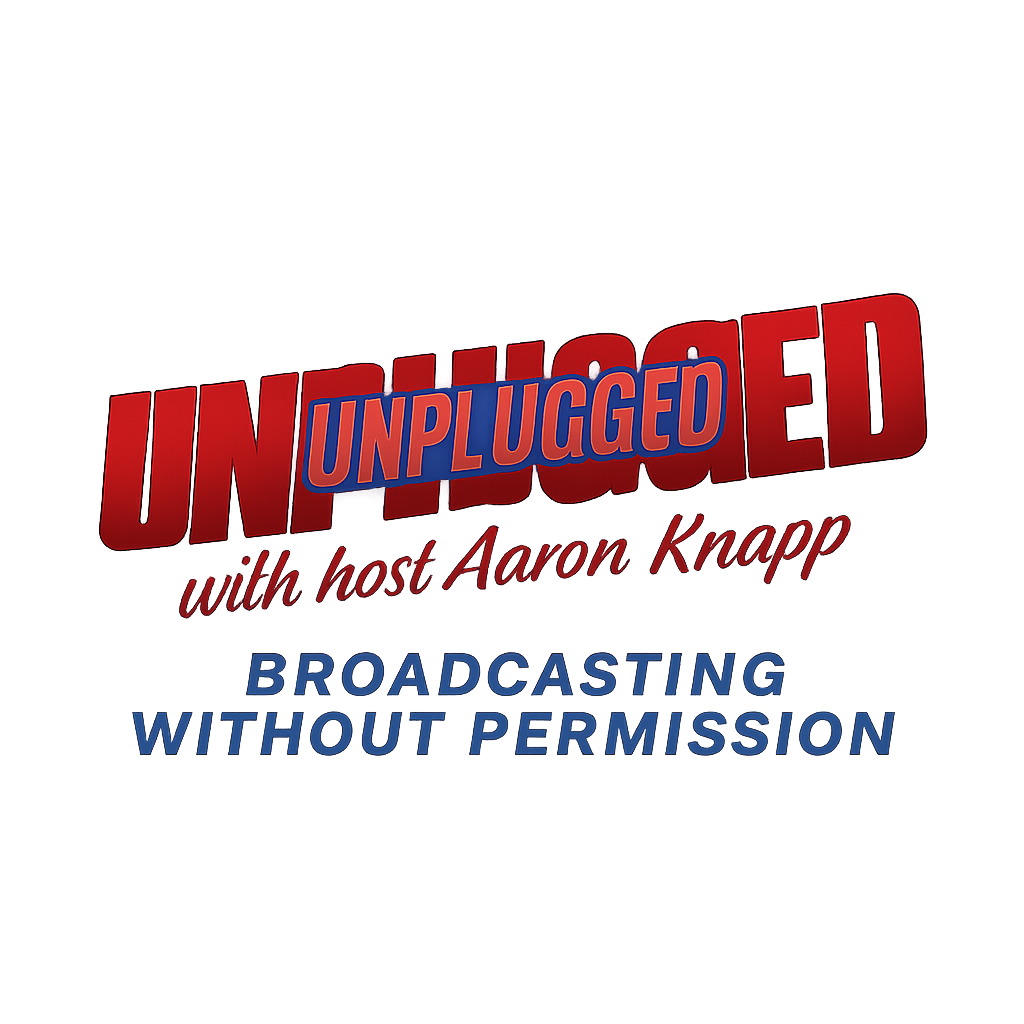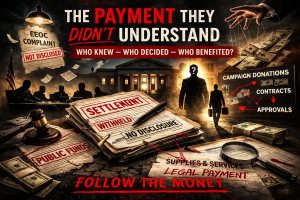A Microphone for Smears: How Lorain’s News Media Became a Mouthpiece for Retaliation

By Aaron C. Knapp, Lorain Politics Unplugged
Apr 21, 2025
I. The Silence Before the Smear

For over a year, I have been publicly documenting corruption, misconduct, and retaliation within Lorain’s most powerful institutions. From law enforcement to the juvenile court, I’ve submitted verified records, public filings, and firsthand testimony. I’ve written about racial disparities, civil rights violations, and whistleblower retaliation. And throughout all of that — the silence from our mainstream local press was deafening.
Thanks for reading Aaron’s Substack! Subscribe for free to receive new posts and support my work.
No Chronicle-Telegram reporter contacted me when I broke the story about internal EEOC complaints involving Lorain Police Chief James McCann. No one asked for an interview when I exposed coordinated retaliation against officers of color. No interest was shown when I revealed campaign finance inconsistencies, illegal dual office-holding, or discriminatory policing tactics — all documented with receipts.
It’s not as though the stories weren’t newsworthy. These are systemic governance failures, backed by legal filings and direct sources. They involve current elected officials, sworn officers, and administrative leaders. But Lorain’s major papers didn’t lift a finger — no FOIAs, no interviews, no follow-ups.
The Chronicle-Telegram did report on the MAHD House Bar incident from April 5 — but they leaned into a narrative that treated me as the problem, not the victim. Despite being the one who was physically assaulted, their coverage mirrored the version pushed by those affiliated with the bar, painting me as the aggressor while glossing over admissions made publicly by podcast hosts and bar staff.
And when it came to my three years of reporting on Chief McCann — years of documented claims, formal filings, and community accounts — there was radio silence. Only now, as new internal documents and OPS interviews come to light, has the gravity of those allegations become undeniable.
Then, within hours on April 21, 2025, two emails arrived. One from Carissa Woytach. The other from David O’Brien. The subject? A civil stalking protection order filed by Tia Hilton — a known supporter of my political opponent. Both reporters were looking for a comment, not about the court response I’d filed or the 40+ pages of evidence I submitted, but about one alleged phrase.
“I’d like to see that bitch dead,” David O’Brien quoted directly in his email, attributing it to Jon Paul Morrow’s statement to the sheriff. He asked: “True or not true?” That was the extent of the inquiry.
Carissa Woytach followed a similar route. “Hilton received calls from two other people that you had made a death threat against her,” she wrote. No request for documentation. No reference to my rebuttal. No mention of the sheriff’s report — which clearly states that the allegations were based entirely on secondhand hearsay, unrecorded, and weeks old.
The question that must be asked is this: why now? After all the stonewalling and silence, why is the press suddenly engaged — and why only to chase hearsay?
What changed?
II. The Manufactured Narrative
Let’s break this down. On April 5, 2025, I was assaulted at MAHD House Bar. I filed a report with the Lorain County Sheriff’s Office. I obtained medical treatment. I publicly documented the incident. Days later, the MAHD House-affiliated podcast aired a grotesque segment mocking the assault, my disability, and my advocacy — even discussing how to discredit me online.
The Chronicle did run an article — but their framing favored the bar’s narrative. The coverage barely acknowledged the assault, instead implying that I had somehow provoked the incident. Quotes from bar regulars and affiliated personalities were treated as fact, while my own documentation and the police report I filed were never referenced. It was a perfect case study in narrative control — and the dangers of selective storytelling.
Then, in mid-April, Tia Hilton filed for a protection order — the basis of which is an alleged verbal threat that supposedly took place three weeks before the MAHD House incident. The timing is not just suspicious — it’s strategic. It’s retaliation, plain and simple.
The so-called threat was reported by Jon Paul Morrow, a Local Political Activist running for Office in a Neighboring Town, who had not messaged me since March 27. He claims he heard it during a March 20 Facebook audio call — one that was neither recorded nor corroborated. Heather Chapin, a reporter from the Morning Journal, is cited as the other source of Hilton’s claim. According to the sheriff’s report, Chapin heard it secondhand, citing “an unnamed source.” That’s the entire foundation of the protection order.
Let’s revisit what Carissa Woytach wrote:
“Hilton received calls from two other people that you had made a death threat against her.”
No verification. No supporting documentation. No indication she had reviewed the sheriff’s report, which notes:
“There is no evidence, no recording, no witness, and the alleged statement was made weeks before the incident being used to validate it.”
David O’Brien, similarly, offered no context:
“Jon Paul Morrow said you told him: ‘I’d like to see that bitch dead.’ True or not true?”
That’s not an inquiry — it’s a gotcha. It’s a demand for denial or confirmation of something that never happened, without any journalistic due diligence.
I responded to both. I provided timelines, transcripts, and a formal denial. I noted that the Sheriff’s Office had already closed the case and that the Oberlin Prosecutor had declined to act on it. I asked whether either reporter had obtained my court response — filed Friday, days before their inquiries. Neither had.
This is the anatomy of a manufactured narrative: build a claim from hearsay, skip verification, bypass legal context, and rush it to press.
III. Political Timing, Media Enabling
Make no mistake: this isn’t just sloppy journalism. This is enabling a political hit. Tia Hilton is a vocal supporter of Angel Arroyo — my opponent in the Ward 6 Council race. She was recorded on video at a council meeting yelling “Nobody wants your crazy ass in office!” just days after his appointment.
The protection order she filed reads like an opposition research document — not a legitimate plea for safety. And yet The Chronicle-Telegram treated it as gospel. No questions about motive. No curiosity about Hilton’s own documented harassment. No exploration of the broader campaign to discredit me, even though Hilton’s public posts span nearly a year and include homophobic slurs and defamatory allegations.
Instead, the press parroted the claim. Not because it’s true — but because it’s politically convenient.
This is a tactic, not a tragedy. A political supporter uses hearsay to launch a court action. A known bar conflict is weaponized into a behavioral justification. And journalists, rather than investigating the systemic abuse of legal tools, ask the accused whether they said “the line.”
David O’Brien has covered law enforcement for decades. He knows what hearsay means in a criminal context. He knows what it means for a case to be closed without prosecution. Yet his inquiry made no mention of those facts.
Carissa Woytach has covered government, housing, and civil matters for years. She knows how protection orders can be misused — how timing and context matter. Yet her email framed the allegation as fact, without interrogating the source.
The deeper question is this: Why does the Lorain press protect power — but not the people?
Why does it take a smear campaign to get them to open their inbox?
IV. Journalism as a Weapon of Retaliation
I’ve said it before, and I’ll say it again: this isn’t journalism — it’s participation. The media isn’t just reporting on a political retaliation campaign. It’s amplifying it. It’s becoming a tool for character assassination.
When reporters ignore a 40+ page evidence packet, disregard official law enforcement findings, and chase a headline based on hearsay, they’re not upholding the public trust. They’re betraying it.
I warned The Chronicle that if they ran a story on this without including my court filing, I would view it as part of the ongoing retaliation. I cc’d the Sheriff. I notified my attorney. Because when the press begins to facilitate false claims, it becomes complicit.
This is exactly how abusers weaponize systems. They count on lazy media. They count on silence around procedural abuse. They count on journalists who won’t bother to ask: “What evidence did you submit in response?” or “What does the sheriff’s report actually say?”
They didn’t ask those questions. And that’s exactly what Hilton and her allies were hoping for.
The Chronicle had time to report on the MAHD House incident accurately. They had years to look into the McCann documents. They had days to request my response in this protection order case.
But they didn’t. Because truth wasn’t the goal — attention was.
And when the press serves power over truth, it stops being free.
V. Beaten to the Story by the Subject
If The Chronicle-Telegram or The Morning Journal were planning to break a scandal — too late. I’m telling the story myself. And unlike them, I’m telling it with facts and legal documentation.
Let’s be clear: this isn’t just about me. It’s about how media outlets can be weaponized to amplify unverified, politically timed allegations while ignoring actual evidence. I haven’t released Messenger logs or private communications to the public — because unlike others, I respect the legal process. All of my evidence has been submitted to the court, where it belongs.
That evidence includes the entire transcript of my communications with Jon Paul Morrow, proving the timeline of the alleged threat is impossible. It includes home surveillance footage showing I never visited the petitioner’s residence. It includes an unsolicited email Hilton sent to me — forcing me to block her on email and Social Media — with taunting language, triggering the cease-and-desist order I issued.
It also includes dozens of statements Hilton made about me online, including defamatory remarks like claiming I would “steal your husband.” These aren’t claims — they’re screenshots. They aren’t speculation — they’re documented harassment. And they paint a very different picture than the one the media is suddenly eager to print.
So no, I won’t let the press paint me with a brush dipped in hearsay. I’m not publishing the evidence because I respect the court’s role. But I am publishing this — because people deserve to know what’s happening before someone distorts it.
To the journalists chasing this story: you had months to investigate my claims of corruption, discrimination, and retaliation in Lorain. You had some time to ask why an assault at MAHD House Bar was never properly reported. You had days to request my response in this protection order case.
Instead, you waited for a moment to strike — and you struck with a quote that never existed.
To my readers: this is why I created Lorain Politics Unplugged. Because in a town where rumors make headlines and truth is ignored, independent journalism is not a luxury — it’s a necessity.
And to those trying to use lies to silence me:
This isn’t your narrative anymore.
It’s mine.




